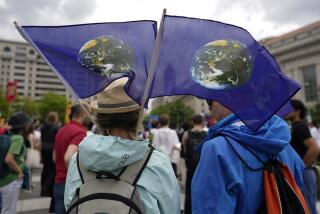THE SUBJECT OF extending daylight saving time...
- Share via
THE SUBJECT OF extending daylight saving time leads grown congressmen to come out with such lines as, “It just makes everyone feel sunnier.” An amendment to set the clocks forward earlier in the year, and set them back a bit later, (cosponsored by Rep. Edward J. Markey [D-Mass.], who spoke the “sunnier” remark) has offered the sole comic relief in the energy bill, an otherwise morose bucket of lawmaking.
The public understandably is focused more on daylight saving time than, say, the bill’s provision on MTBE lawsuits. It is easier to comprehend, for one thing, how extra barbecuing opportunity affects the world. Mothers also made it an issue because the extension would mean some children would go to school in the dark. No matter. Because kids haven’t had their coffee by then anyway, they probably don’t notice how light or dark it is.
Then there is the more basic truth that, grown-ups though many of us pretend to be, people don’t like the dark. We speak of dark days and dark thoughts and dark (or darth) lords. Darkness is such a fearsome thing that humans have long needed rituals to diminish its hold on winter.
The first known attempt to institute daylight saving time came with the pagans, who celebrated the winter solstice because it marked the point at which future days would grow longer. They put candles in their trees to bring symbolic light.
The Jewish festival of Hanukkah is also, through a more indirect route, linked in timing to the winter solstice. The candle-lighting commemorates a miracle of light that doesn’t appear in the apocryphal story of the Maccabees; the ceremony of bringing light into dark days was added later, along with the story of the miracle.
Christians extended the concept of light to include the birth of a savior in the midst of darkness, when Pope Julius I decided more than 1,500 years ago that Christmas should be celebrated Dec. 25 so it would replace a pagan solstice holiday. The candles in trees, though, remained as part of the celebration.
Thus the legislative extension of daylight saving time, though it won’t reach into December, becomes our modern ritual for beating back the darkness. The first biblically recorded words of God were, “Let there be light,” after which light and darkness were separated. It seems some days as though darkness got too big a share. At such times, Congress steps in.
More to Read
Get the L.A. Times Politics newsletter
Deeply reported insights into legislation, politics and policy from Sacramento, Washington and beyond. In your inbox twice per week.
You may occasionally receive promotional content from the Los Angeles Times.










